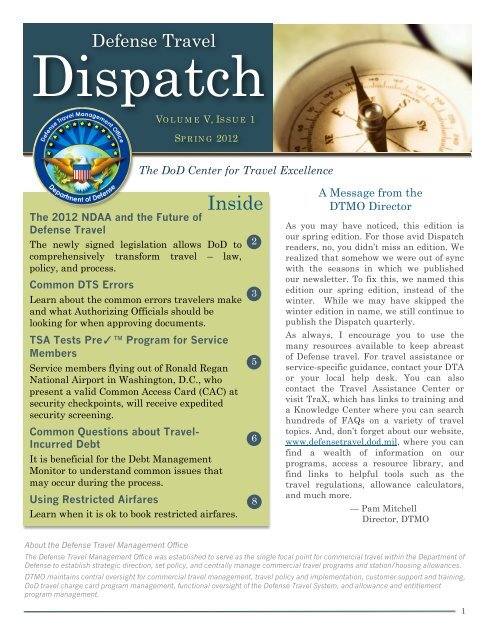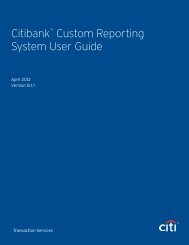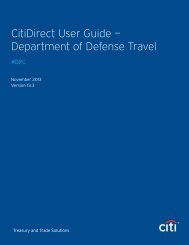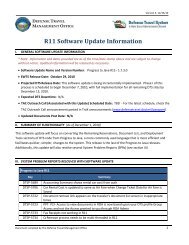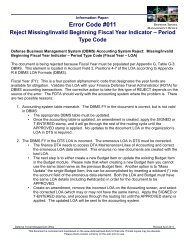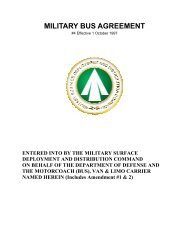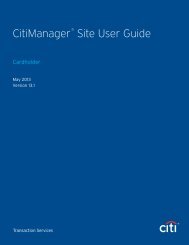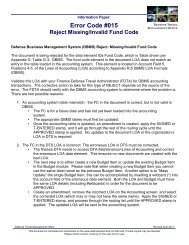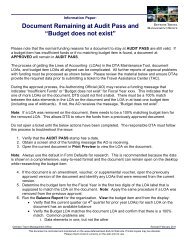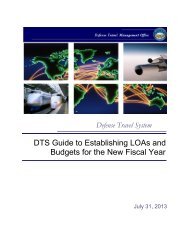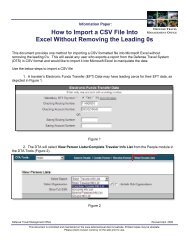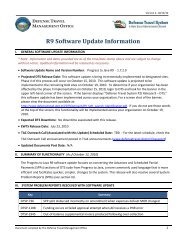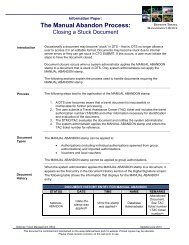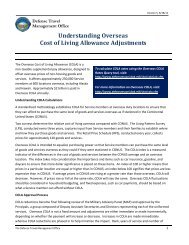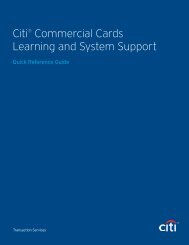Volume, V, Issue 1, Spring 2012 - DTMO
Volume, V, Issue 1, Spring 2012 - DTMO
Volume, V, Issue 1, Spring 2012 - DTMO
You also want an ePaper? Increase the reach of your titles
YUMPU automatically turns print PDFs into web optimized ePapers that Google loves.
Defense Travel<br />
Dispatch<br />
VOLUME V, ISSUE 1<br />
SPRING <strong>2012</strong><br />
The DoD Center for Travel Excellence<br />
The <strong>2012</strong> NDAA and the Future of<br />
Defense Travel<br />
The newly signed legislation allows DoD to<br />
comprehensively transform travel – law,<br />
policy, and process.<br />
Common DTS Errors<br />
Learn about the common errors travelers make<br />
and what Authorizing Officials should be<br />
looking for when approving documents.<br />
TSA Tests Pre✓ Program for Service<br />
Members<br />
Service members flying out of Ronald Regan<br />
National Airport in Washington, D.C., who<br />
present a valid Common Access Card (CAC) at<br />
security checkpoints, will receive expedited<br />
security screening.<br />
Common Questions about Travel-<br />
Incurred Debt<br />
It is beneficial for the Debt Management<br />
Monitor to understand common issues that<br />
may occur during the process.<br />
Using Restricted Airfares<br />
Inside<br />
Learn when it is ok to book restricted airfares.<br />
2<br />
3<br />
5<br />
6<br />
8<br />
A Message from the<br />
<strong>DTMO</strong> Director<br />
As you may have noticed, this edition is<br />
our spring edition. For those avid Dispatch<br />
readers, no, you didn’t miss an edition. We<br />
realized that somehow we were out of sync<br />
with the seasons in which we published<br />
our newsletter. To fix this, we named this<br />
edition our spring edition, instead of the<br />
winter. While we may have skipped the<br />
winter edition in name, we still continue to<br />
publish the Dispatch quarterly.<br />
As always, I encourage you to use the<br />
many resources available to keep abreast<br />
of Defense travel. For travel assistance or<br />
service-specific guidance, contact your DTA<br />
or your local help desk. You can also<br />
contact the Travel Assistance Center or<br />
visit TraX, which has links to training and<br />
a Knowledge Center where you can search<br />
hundreds of FAQs on a variety of travel<br />
topics. And, don’t forget about our website,<br />
www.defensetravel.dod.mil, where you can<br />
find a wealth of information on our<br />
programs, access a resource library, and<br />
find links to helpful tools such as the<br />
travel regulations, allowance calculators,<br />
and much more.<br />
— Pam Mitchell<br />
Director, <strong>DTMO</strong><br />
About the Defense Travel Management Office<br />
The Defense Travel Management Office was established to serve as the single focal point for commercial travel within the Department of<br />
Defense to establish strategic direction, set policy, and centrally manage commercial travel programs and station/housing allowances.<br />
<strong>DTMO</strong> maintains central oversight for commercial travel management, travel policy and implementation, customer support and training,<br />
DoD travel charge card program management, functional oversight of the Defense Travel System, and allowance and entitlement<br />
program management.<br />
1
<strong>Issue</strong> 1 <strong>Spring</strong> <strong>2012</strong><br />
Defense Travel Dispatch<br />
The <strong>2012</strong><br />
NDAA and the<br />
Future of<br />
Defense Travel<br />
The Office of the Secretary of Defense, Personnel<br />
and Readiness (P&R) initiated a major legislative<br />
reform enacted in the <strong>2012</strong> NDAA—title 37,<br />
Chapter 8, Consolidation and Reform of Travel and<br />
Transportation Authorities. The new legislation<br />
allows the DoD to comprehensively transform<br />
travel – law, policy, and process. Transforming<br />
travel will simplify rules for the traveler, reduce<br />
outlays for the Department, increase mission<br />
flexibility for leaders, and leverage capabilities of<br />
the travel industry to respond to changes in<br />
technology and the market. These authorities<br />
enable the Secretary of Defense, and<br />
other Administering Secretaries, to<br />
promulgate more flexible, less<br />
complicated travel<br />
regulations and to conduct<br />
pilot programs that<br />
provide a test<br />
environment to evaluate<br />
innovative programs, policies and technologies.<br />
Successful implementation of our travel<br />
transformation efforts will result in a greater<br />
experience for the traveler and will help reduce the<br />
cost of doing business.<br />
Transformation is a long-term effort that will be<br />
enacted over many years. However, there are also<br />
some things you will see sooner:<br />
• A prototype compliance application for the<br />
electronic verification of travel claims<br />
• A travel simplification model and framework<br />
for future travel allowances and business rules<br />
• “Fast track” policy and process simplification<br />
changes that will not immediately impact the<br />
travel system<br />
• Consolidation of uniformed and civilian travel<br />
regulations (i.e., JTR and JFTR)<br />
• Transformation of some travel programs—for<br />
example:<br />
– Analyze existing DoD lodging programs,<br />
determine opportunities for<br />
improvements, and develop strategy for<br />
central management and strategic<br />
sourcing<br />
– Pilot use of electronic receipts<br />
• A plan for processing all travel claims<br />
electronically by end of 2016<br />
• Identification and implementation of some<br />
travel efficiencies —for example:<br />
– Tax exemption from state and local<br />
taxes<br />
– Exploring opportunities to reduce cost<br />
per trip (e.g., TDY greater than 30 days,<br />
standard TDY while enroute)<br />
– Strategically sourcing, to include<br />
bundling of amenities<br />
Successful implementation of our travel<br />
transformation efforts will result in a greater<br />
experience for the traveler and will also help<br />
reduce the cost of doing business.<br />
2
Defense Travel Dispatch<br />
<strong>Issue</strong> 1 <strong>Spring</strong> <strong>2012</strong><br />
Common DTS Errors<br />
Awareness, training, and administrative diligence are key to<br />
addressing most DTS errors. Below are the most common errors<br />
that travelers make in DTS, which offers insight into what<br />
Authorizing Officials (AO) should be looking for when approving<br />
documents.<br />
• Duplicate Expenses. Many travelers add certain items as a reimbursable expense when they are<br />
already being reimbursed for these expenses on a different screen in DTS. The most common<br />
duplicate expenses are for lodging, airfare, rental car, and Commercial Travel Office (CTO) fees.<br />
When travel reservations are made through DTS, the system automatically enters the cost for airfare,<br />
CTO fees, and the rental car cost to the voucher. For example, travelers often claim airfare or rental<br />
car expenses on the non-mileage expense screen when it is already listed as a transportation expense.<br />
Further, lodging should never be entered as a reimbursable expense unless it is a dual lodging cost; it<br />
is already being reflected on the per diem screen.<br />
• Outside CONUS Laundry Expenses Reimbursed. Laundry is only an authorized reimbursable<br />
expense when travel is within CONUS. Outside CONUS (including Alaska, Hawaii, and US<br />
territories), laundry is included in the incidental expense portion of per diem and is not separately<br />
reimbursable.<br />
• Lodging Taxes Reimbursed for Hotels in Foreign Locations. Lodging taxes are only an<br />
authorized reimbursable expense within CONUS and non-foreign OCONUS locations (including<br />
Alaska, Hawaii, and US territories). In foreign locations, lodging taxes are computed in the maximum<br />
lodging per diem rate, and must be added to the daily lodging rate claimed on the per diem screens in<br />
DTS. Travelers may not be reimbursed more than the maximum locality rate for lodging for the<br />
combined cost of the room plus daily taxes unless the AO has approved Actual Expense<br />
Authorization.<br />
• Lodging Incurred While “In Transit.” Many travelers<br />
enter lodging as a reimbursable expense for days that are<br />
shown as In Transit in DTS. In Transit can only exist on<br />
days when travelers are actually traveling overnight and not<br />
for those days when travelers spend the night in lodging. If<br />
DTS shows a traveler as In Transit on a night when they<br />
incur a lodging expense, the traveler must amend the<br />
itinerary to show where they spent the night, and enter the<br />
lodging cost on the per diem screen. Otherwise, they will not<br />
receive the correct per diem rate and will be either under- or<br />
overpaid.<br />
(Continued on page 4)<br />
In accordance with the<br />
<strong>2012</strong> NDAA, <strong>DTMO</strong><br />
will develop a travel<br />
policy compliance program<br />
within the next year. The<br />
program will include an<br />
application that will identify<br />
errors in DTS travel documents<br />
and automatically notify<br />
travelers and administrators<br />
so corrective action can be<br />
taken.<br />
3
<strong>Issue</strong> 1 <strong>Spring</strong> <strong>2012</strong><br />
4<br />
(Continued from page 3)<br />
• Baggage Tips. Uniformed members<br />
may be reimbursed for baggage<br />
handling tips for personal baggage at<br />
terminals but not at lodging<br />
establishments. Both civilian<br />
employees and uniformed members<br />
can be reimbursed tips for handling<br />
government property at both<br />
transportation terminals and lodging<br />
establishments. Civilian employees<br />
may be reimbursed for baggage<br />
handling tips for personal baggage<br />
only when they have a disability or<br />
special need, when dependents are<br />
traveling unaccompanied at<br />
government expense without per<br />
diem, or for dependent’s baggage<br />
that they cannot carry when<br />
dependents are traveling<br />
accompanied by the sponsor.<br />
• Other Tips. The only other tips that<br />
may be reimbursed are for<br />
transportation such as taxis or<br />
shuttles. All other tips for maids,<br />
doormen, concierges, and meals are<br />
part of per diem and are not<br />
separately reimbursable.<br />
• Rental Car Insurance. Insurance<br />
for rental cars in the US is not<br />
reimbursable. It is only reimbursable<br />
in a foreign country when the<br />
appropriate authority determines<br />
that the local law requires it.<br />
• Rental Car Upgrades. Unless an<br />
Authorizing Official determines that<br />
there is a need for a rental car<br />
upgrade, neither the cost of the<br />
upgrade nor any additional taxes for<br />
the cost of the upgrade are<br />
reimbursable.<br />
Defense Travel Dispatch<br />
New Documentation<br />
Required for Other<br />
Than Economy/Coach<br />
Class Transportation<br />
DoD policy requires<br />
economy/coach-class<br />
travel accommodations<br />
to be used for all official<br />
government travel,<br />
unless the Other Than<br />
Economy-/Coach-Class<br />
(i.e., premium class) fare<br />
is<br />
cheaper.<br />
Transportation using Other Than Economy-/Coach-Class at<br />
government expense is permitted on an exception-only basis<br />
when fully justified and approved by the appropriate<br />
premium class authority, as stated in the Joint Federal<br />
Travel Regulations (JFTR) and Joint Travel Regulations<br />
(JTR). It is the traveler’s responsibility to receive proper<br />
approval for Other Than Economy-/Coach-Class travel.<br />
As of April 1, <strong>2012</strong>, the JFTR and JTR Appendix H will<br />
require an Other Than Economy-/Coach-Class<br />
Transportation Approval Checklist to be submitted as part of<br />
the approval process. The checklist certifies that all decision<br />
factors and other alternatives were considered prior to<br />
approval of Other Than Economy-/Coach-Class<br />
Transportation. The Other Than Economy-/Coach-Class<br />
checklist must be certified by the appropriate Authorizing<br />
Officials (AO) and submitted as part of the supporting<br />
approval documentation. AOs should check local business<br />
rules for information on using this form.<br />
A Commercial Travel Office (CTO) will not issue Other Than<br />
Economy-/Coach-Class Transportation tickets without proper<br />
authorization. Additionally, CTOs must report the issuance<br />
of Other Than Economy-/Coach-Class tickets in accordance<br />
with applicable commercial travel contracts.<br />
For additional information regarding Other Than Economy-<br />
/Coach-Class Transportation, contact your Transportation<br />
Office for assistance. To access the JFTR/JTR Appendix H,<br />
go to http://www.defensetravel.dod.mil/site/travelreg.cfm.
Defense Travel Dispatch<br />
TSA Tests Pre✓<br />
Program for<br />
Service Members<br />
In March, the Transportation Security Administration<br />
(TSA) expanded its trusted traveler program known as<br />
Pre✓ to Service members flying out of Ronald Reagan<br />
Washington National Airport (DCA). Service members<br />
including drilling Reservists, National Guardsmen, and<br />
members of the Coast Guard who present a valid Common<br />
Access Card (CAC) at security checkpoints will receive<br />
expedited security screening.<br />
To participate, members must go to the TSA Pre✓ lane<br />
at the security checkpoint in terminal B (gates 10-22), and<br />
present their CAC to a TSA officer who will scan the card<br />
to verify their status. Once verified by the Department of<br />
Defense (DoD), members will no longer be required to<br />
remove their shoes, outerwear, belts, laptops and any<br />
small liquid containers from carry-ons when going through<br />
security.<br />
Eligible Service members do not need to be on official<br />
travel or be in uniform to take advantage of TSA Pre✓<br />
program. Also, family members ages 12 and under<br />
traveling with an eligible member can process through<br />
expedited screening.<br />
While this program offers expedited screening for<br />
members, TSA plans to continue applying random and<br />
unpredictable screening measures as part of the agency’s<br />
layered approach to prevent terrorists from “gaming” the<br />
system.<br />
The program is expected to be expanded to members flying<br />
out of Seattle-Tacoma International Airport (SEA) and to<br />
Atlanta-Hartsfield International Airport in the upcoming<br />
months.<br />
TSA hopes to expand the Pre✓ program to DoD Service<br />
members and civilians at airports across the country in the<br />
future.<br />
For more information on TSA’s Pre✓ program, visit<br />
http://www.tsa.gov/what_we_do/rbs_dod.shtm.<br />
<strong>Issue</strong> 1 <strong>Spring</strong> <strong>2012</strong><br />
According to the Joint Federal Travel<br />
Regulations (JFTR) and the Joint Travel<br />
Regulations (JTR), the standard size<br />
vehicle for all official travel is a compact<br />
car. However, when a compact car does<br />
not meet mission requirements, an<br />
Authorizing Official (AO) can approve a<br />
larger size or hybrid vehicle.<br />
Booking A<br />
Larger<br />
Rental Car<br />
It is up to the organization to determine<br />
if a larger size vehicle is warranted. The<br />
regulation does not address the number<br />
of people required for a larger size<br />
vehicle such as a SUV. The U.S.<br />
Government Rental Car Agreement<br />
allows government employees traveling<br />
together on official government business<br />
to be additional drivers and they are not<br />
required to be listed on the rental<br />
contract.<br />
An AO may authorize larger vehicles to<br />
accommodate special circumstances such<br />
as the height of an individual or excess<br />
official luggage (e.g., test equipment,<br />
supplies, etc.). Booking a vehicle other<br />
than a compact car will require a<br />
justification.<br />
Not all rental car companies’<br />
participating locations offer larger size<br />
vehicles. Please go to<br />
http://www.defensetravel.dod.mil/site/<br />
rental.cfm to review the rental car<br />
ceiling rate charts to determine if a<br />
particular vehicle size is available under<br />
the Rental Car Agreement at a specific<br />
rental location.<br />
5
<strong>Issue</strong> 1 <strong>Spring</strong> <strong>2012</strong><br />
Common<br />
Questions About<br />
Travel-Incurred<br />
Defense Travel Dispatch<br />
The debt management feature in DTS assists with the<br />
monitoring of a debt situation and collection process, as well as<br />
management of travel documents that are due to the United<br />
States (Due U.S.) Government. Much of the debt management<br />
process occurs automatically in DTS, but coordinating certain<br />
actions to be taken against the debt and recording the results of<br />
those actions are the responsibility of the Debt Management<br />
Monitor (DMM).<br />
While performing these duties, it is very beneficial for the DMM<br />
to understand common issues which may occur during the<br />
process and the questions below touch on just a few of these. For<br />
additional information on the debt process, visit The Guide for<br />
Travel-Incurred Debt at http://www.defensetravel.dod.mil/Docs/<br />
Guide_to_Managing_Travel_Incurred_Debt.pdf.<br />
Q: Why is the debt notification email<br />
important?<br />
The debt notification email is important for several<br />
reasons. First, it provides a traveler with a formal<br />
notification of debt to the government. Secondly, it<br />
includes necessary information for making a<br />
payment, including the DFAS mailing address if<br />
making a payments by check or money order, the<br />
Transaction ID required by Pay.gov, and payroll<br />
deduction instructions. It also contains information<br />
and time limitations for contesting the debt.<br />
Q: What in DTS generates a debt notification<br />
email?<br />
A specific transaction sent from the accounting<br />
system will change the status of the digital<br />
signature page from AR SUMBITTED to POS ACK<br />
RECEIVED, which generates the debt notification<br />
email.<br />
Q: If a notification is not received within<br />
approximately eight days, what should a<br />
traveler or DMM do?<br />
If an email is not received within approximately<br />
eight days after approval of a DUE US voucher,<br />
travelers should contact their organization’s DMM<br />
for assistance. The DMM will review the document<br />
history to check the stamps (as mentioned above)<br />
and resolve a potential accounting reject.<br />
Q: If I do not have the Debt Notification Letter,<br />
can I use the Pay.gov remittance option?<br />
In order to use the Pay.gov remittance option, an<br />
indebted traveler must have received a Debt<br />
Notification email from DTS. It contains a 9-digit<br />
transaction ID, which can be found beneath the line<br />
of accounting listed in the email. DTS typically<br />
generates this email approximately five to eight<br />
days after approval of the DUE US document and<br />
both the traveler and DMM receive a copy. A<br />
traveler should contact their DMM or Defense<br />
Travel Administrator (DTA) if they have not<br />
received this email after the standard timeframe. If<br />
the Debt Notification email containing the<br />
transaction ID is deemed unrecoverable, then the<br />
required transaction ID is also unrecoverable, and<br />
the indebted traveler should remit payment using a<br />
check or money order.<br />
Q: If I have not received confirmation of the<br />
debt payment, what should I do next?<br />
If a traveler has made direct remittance for a travelrelated<br />
debt but DTS does not receive a transaction<br />
recording the collection, the DMM should contact<br />
the Travel Assistance Center (TAC) to obtain a copy<br />
of the manual Cash Collection Voucher (CCV).<br />
DFAS processes collections and sends a copy of the<br />
resulting CCV to the TAC, so the TAC may then<br />
expedite the retrieval and distribution of the CCV<br />
via an attachment to the ticket.<br />
6
Defense Travel Dispatch<br />
<strong>Issue</strong> 1 <strong>Spring</strong> <strong>2012</strong><br />
Coming to A Mobile<br />
Device Near You . . .<br />
Have you ever wanted to quickly look up per diem rates or<br />
City Pair Fares? If so, you can now use TraX Touch, the<br />
mobile version of Travel Explorer (TraX). Users can access<br />
some of the same familiar features available in the desktop<br />
version of TraX, as well as a few new features. With Trax<br />
Touch, users can also check the status of DTS or EWTS,<br />
view the latest FAA Alerts, and check the status of an<br />
upcoming flight. <br />
TraX Touch is available for mobile devices including iPhone,<br />
Android, Blackberry 6+, iPod Touch, iPad, Android Tablets,<br />
Blackberry Playbook, and Windows Mobile 7.<br />
While TraX Touch has the look and feel of a mobile app, it is<br />
actually a website which does not require users to download<br />
any software. To access TraX Touch from a mobile device,<br />
use your native web browser to go to: https://<br />
www.defensetravel.dod.mil/mobile, and save the URL as a<br />
shortcut on your smartphone or tablet.<br />
Note: For frequently asked questions regarding TraX Touch, visit<br />
the Knowledge Center in TraX. <br />
TRUSTED<br />
TRAVELER<br />
PROGRAMS<br />
The U.S. Customs and Border<br />
Protection Agency offers several<br />
'trusted traveler' programs that<br />
are designed to expedite the<br />
security screening process at<br />
participating airports for preapproved,<br />
low risk travelers.<br />
These programs, such as<br />
SENTRI, Nexus, and Global<br />
Entry, are voluntary programs<br />
and are not a requirement for<br />
official travel. According to 5<br />
USC §5946 per GSA Bulletin<br />
FTR 08-05 of 25 June 2008,<br />
travelers are prohibited from<br />
using government funds to<br />
obtain membership in these<br />
types of programs. Therefore,<br />
enrollment fees for these<br />
programs are not a reimbursable<br />
expense.<br />
7
<strong>Issue</strong> 1 <strong>Spring</strong> <strong>2012</strong><br />
Defense Travel Dispatch<br />
Using<br />
Restricted<br />
Airfares<br />
Many DoD travelers frequently ask why they can’t<br />
use low airfares that they find on Internet travel<br />
sites. The truth is, under the right circumstances<br />
they can purchase lower-cost, restricted airfares<br />
for official travel – but DoD policy requires tickets<br />
for official travel be purchased through the<br />
contracted Commercial Travel Office (CTO). To do<br />
so, they must first get approval from their travel<br />
Authorizing Official (AO) and they must be sure<br />
that they don’t violate any of the rules related to<br />
the General Services Administration’s contract<br />
City-Pair Program. In addition, they need to weigh<br />
the savings against the potential additional costs<br />
related to changing or canceling a ticket.<br />
Under the rules for the city-pair program,<br />
travelers can purchase any ticket at a cost lower<br />
than the City-Pair fare if the fare is available to<br />
the general public. They cannot use a lower-cost<br />
fare that is limited to government travelers such<br />
as a discount government (DG) or category z<br />
(CATZ) fare. In addition, they must use a U.S. flag<br />
carrier, if available, and they can only fly on DoD<br />
approved airlines. Finally, if the airline that has<br />
the contract for the City-Pair also offers the same<br />
reduced fare, then the traveler must purchase the<br />
reduced fare ticket from that City-Pair carrier.<br />
The advantage with the City-Pair Program is that<br />
the tickets are unrestricted, which means they can<br />
be changed without any penalties and are fully<br />
refundable, if canceled. With restricted fare<br />
tickets, they are non-refundable, and the value of<br />
any canceled tickets can only be applied towards a<br />
new ticket purchased by the same traveler within<br />
the time frame established by the airline,<br />
generally with a hefty penalty. Whenever a<br />
traveler changes a restricted ticket, the traveler<br />
must pay a change fee in addition to any increase<br />
in the ticket based on what fares are available at<br />
the time the change is made. Therefore, the<br />
traveler and AO must consider how likely it is that<br />
the trip will not be changed or canceled, as well as<br />
what the likelihood is that the traveler will be able<br />
to re-use the ticket within the timeframe required<br />
by the airline if the trip is canceled. Travelers<br />
whose plans change frequently, or travel at the<br />
last minute, generally are not good candidates for<br />
restricted tickets.<br />
Each airline has different rules, change fees, and<br />
penalties, so the traveler and AO must read the<br />
particular airline’s fare rules carefully before<br />
deciding to purchase a restricted ticket.<br />
Purchasing a cheaper restricted ticket should be<br />
considered if a trip has very firm start and end<br />
dates, such as a conference, and the traveler is<br />
unlikely to be recalled home or elsewhere. If the<br />
cost difference between a restricted ticket and a<br />
City-Pair ticket is greater than any change fee,<br />
penalty, then the restricted ticket could be a good<br />
way to save government resources.<br />
8
Defense Travel Dispatch<br />
BEWARE:<br />
Extra Hotel Fees<br />
If you have stayed in a hotel, you are probably<br />
aware that there are fees for using the telephone,<br />
enjoying a visit to the mini-bar or calling room<br />
service for that late night burger. But what you<br />
may not know is that there may be additional fees<br />
imposed by a CONUS hotel that will change the<br />
total cost of your stay and could affect your<br />
reimbursement.<br />
Several years ago hotels started charging “early<br />
departure fees” for leaving earlier than your<br />
original reservation stated. If you are staying in a<br />
resort, you may be charged a “resort fee” or a<br />
“housekeeping fee.” Some hotels are even imposing<br />
“energy surcharges” and “utility service” fees. In<br />
addition to a state tax, some locations impose a<br />
Quick Tip: Keep<br />
Them Moving!<br />
If a designated Authorizing Official (AO) on a<br />
routing list is unavailable to approve a Defense<br />
Travel System (DTS) document, a traveler’s<br />
reservations cannot be made and airline tickets<br />
cannot be issued. Fortunately, Defense Travel<br />
Administrators (DTA) can quickly resolve this<br />
situation.<br />
If another AO is available, a DTA can add a<br />
replacement Routing Official (RO) using the DTA<br />
Maintenance Tool. When a replacement RO is<br />
added, it creates an adjustment and the system<br />
restarts the electronic routing process. Making<br />
this change means travelers or users with access<br />
to that traveler’s documents must re-sign any<br />
impacted documents.<br />
A second solution is to ensure at least one person<br />
within the organization’s chain of command has<br />
the correct permission levels and approval<br />
override. Their intervention moves the document<br />
<strong>Issue</strong> 1 <strong>Spring</strong> <strong>2012</strong><br />
city, county or<br />
municipality tax. In<br />
some situations, there is<br />
a tax for renovation of a<br />
convention center or a<br />
new freeway. Most of<br />
these fees are not negotiable and are therefore<br />
reimbursable as a result. However, some fees, like<br />
gym usage, newspaper delivery, or pet care, are<br />
“optional” and are not considered a reimbursable<br />
expense.<br />
It is important to note that in OCONUS locations,<br />
these costs are typically included in the overall hotel<br />
cost and therefore should not be claimed or<br />
reimbursed separately.<br />
Not all hotels charge additional fees and it is a good<br />
idea to be aware of which fees are reimbursable so<br />
you can make an informed hotel selection to avoid<br />
some or all of these costs. Review the JFTR/JTR,<br />
Appendix G to determine which charges are covered<br />
prior to making a hotel reservation.<br />
forward for approval without altering the routing<br />
list. It is recommended that this person not be a<br />
DTA so that separation of duties guidelines are not<br />
violated.<br />
How will a DTA know when these options should be<br />
exercised? DTAs should be proactively monitoring<br />
all DTS documents in order to catch this type of<br />
situation and implement the change before it<br />
becomes a problem. Additionally travelers should be<br />
aware of how long it normally takes for document<br />
approval in their organization and contact their<br />
DTA if approval is not received.<br />
Of course, the ongoing maintenance of accurate<br />
routing lists is the best practice and the preferred<br />
way to prevent the need for either action. DTAs<br />
should regularly review routing lists to ensure only<br />
personnel who are present in the organization and<br />
who have access to DTS are included. Further, it is<br />
important for DTAs to be aware of who in a routing<br />
list is on leave or without access to the system.<br />
Prior to incorporating any of the suggestions above<br />
in your organization’s procedures, please check for<br />
alignment with your component’s guidance.<br />
9
<strong>Issue</strong> 1 <strong>Spring</strong> <strong>2012</strong><br />
Defense Travel Dispatch<br />
DoD Lodging Link Added<br />
To DTS Homepage<br />
In an effort to better assist travelers with utilizing DoD<br />
lodging when traveling to military installations, a link to<br />
www.dodloging.net has been added to the DTS homepage. The<br />
link directs users to a website that allows travelers to easily<br />
check availability and book accommodations at DoD Lodging<br />
properties. <br />
GTCC ATM Fees<br />
Increasing<br />
The ATM service fee charged by Citi, the<br />
Government Travel Charge Card (GTCC) vendor,<br />
will be increasing from 2% to 2.2%. The fee<br />
remains an authorized reimbursable expense<br />
when the withdrawal is associated with official<br />
travel. Cardholders will also receive notification<br />
either in their next statement or via separate<br />
mailing if no statement is generated. Rates will<br />
go in to effect on June 22 for USAF, June 23 for<br />
DoD Agencies and July 6 for Navy, USMC and<br />
July 11 for Army. Questions should be directed to<br />
your Agency Program Coordinator (APC).<br />
Did You Know . . .<br />
Did you know that when<br />
travelers fail to notify their<br />
Commercial Travel office<br />
(CTO) of an unused or<br />
partially unused ticket it costs the Government<br />
money? Unused tickets have a monetary value<br />
and must be returned to the Government.<br />
Cancellations resulting in an unused or partially<br />
unused ticket should be reported to the CTO as<br />
soon as possible and must be returned in the<br />
manner they were received. If you received a<br />
paper ticket from your CTO, the paper ticket<br />
must be returned to the CTO in order for the<br />
refund to be initiated.<br />
Looking for<br />
DTS or<br />
EWTS<br />
Downtime?<br />
System downtime notifications are posted in<br />
several locations. Travelers and administrators<br />
are encouraged to look at the “DTS Update” or<br />
“EWTS Update” announcements posted in the<br />
Notices section of the DTS homepage<br />
(www.defensetravel.osd.mil) or the<br />
“Announcement” section of TraX<br />
(www.defensetravel.dod.mil/passport). Downtime<br />
is also posted in the Message Center after user<br />
log in.<br />
About the Defense Travel Dispatch<br />
The Defense Travel Dispatch is a quarterly<br />
publication issued by the Defense Travel<br />
Management Office, Office of the Under<br />
Secretary of Defense (Personnel & Readiness).<br />
The reproduction of the Dispatch is<br />
permissible for official use only.<br />
To subscribe or to view previous editions, visit<br />
www.defensetravel.dod.mil<br />
<strong>Volume</strong> V, <strong>Issue</strong> 1 – <strong>Spring</strong> <strong>2012</strong><br />
10


